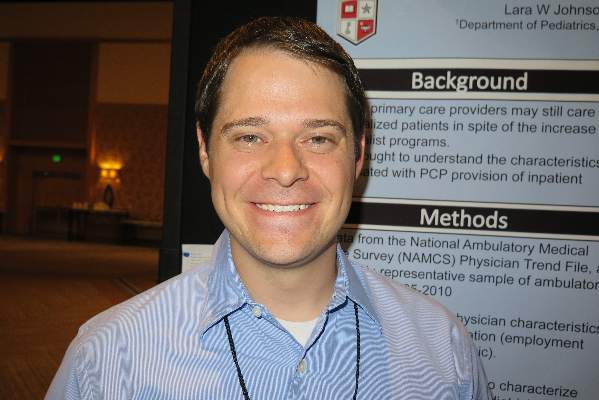User login
SAN DIEGO – Nearly two-thirds of pediatricians provide inpatient hospital care in a given week of practice, results from a large national survey showed.
“We know that the number of overall hospitalists has rapidly increased in the United States, but we wanted to know how many of the non-hospitalists were continuing to provide inpatient care,” Dr. Shaughn M. Nunez said in an interview at the annual meeting of the American Academy of Pediatrics.
Dr. Nunez and his associates used the National Ambulatory Medical Care Survey (NAMCS), a nationally representative sample of ambulatory visits conducted by the National Center for Health Statistics. They defined providing hospital care as answering “yes” to the question regarding making any hospital visit in the last normal week of practice, and generated descriptive statistics for practice, physician and community characteristics. Next, they used bivariate tests of association to explore the relationship between practice characteristics and provision of hospital care.
Of 634 pediatricians who participated in the survey from 2005-2010, nearly two-thirds of respondents (62%) reported providing hospital care in the previous week, reported Dr. Nunez, a hospitalist at Texas Tech University Health Sciences Center, Lubbock. Pediatricians were more likely to report providing inpatient care, compared with family physicians (42%) and internists (58%), (P < .001).
The proportion of pediatricians who provided inpatient care ranged from 67% in 2005 to 58% in 2010. Those with more than 75% of patients on Medicaid were less likely to provide inpatient care (42.6%, P < .007). In addition, those who practiced in a community-clinic setting provided inpatient care less frequently, compared with those in a private practice setting (35% vs. 67%, respectively; P < .001).
Physician employment status also weighed in. Those who owned their practice reported providing inpatient care 68% of the time, compared with 55% of physician-employees and 47% of physicians working on a contract basis (P = .012). Practice location in a metropolitan area and region of the country were not associated with the provision of inpatient care.
Dr. Nunez acknowledged certain limitations of the study, including the fact that the researchers were unable to distinguish if pediatricians were providing newborn nursery care or inpatient care. He reported having no financial disclosures.
SAN DIEGO – Nearly two-thirds of pediatricians provide inpatient hospital care in a given week of practice, results from a large national survey showed.
“We know that the number of overall hospitalists has rapidly increased in the United States, but we wanted to know how many of the non-hospitalists were continuing to provide inpatient care,” Dr. Shaughn M. Nunez said in an interview at the annual meeting of the American Academy of Pediatrics.
Dr. Nunez and his associates used the National Ambulatory Medical Care Survey (NAMCS), a nationally representative sample of ambulatory visits conducted by the National Center for Health Statistics. They defined providing hospital care as answering “yes” to the question regarding making any hospital visit in the last normal week of practice, and generated descriptive statistics for practice, physician and community characteristics. Next, they used bivariate tests of association to explore the relationship between practice characteristics and provision of hospital care.
Of 634 pediatricians who participated in the survey from 2005-2010, nearly two-thirds of respondents (62%) reported providing hospital care in the previous week, reported Dr. Nunez, a hospitalist at Texas Tech University Health Sciences Center, Lubbock. Pediatricians were more likely to report providing inpatient care, compared with family physicians (42%) and internists (58%), (P < .001).
The proportion of pediatricians who provided inpatient care ranged from 67% in 2005 to 58% in 2010. Those with more than 75% of patients on Medicaid were less likely to provide inpatient care (42.6%, P < .007). In addition, those who practiced in a community-clinic setting provided inpatient care less frequently, compared with those in a private practice setting (35% vs. 67%, respectively; P < .001).
Physician employment status also weighed in. Those who owned their practice reported providing inpatient care 68% of the time, compared with 55% of physician-employees and 47% of physicians working on a contract basis (P = .012). Practice location in a metropolitan area and region of the country were not associated with the provision of inpatient care.
Dr. Nunez acknowledged certain limitations of the study, including the fact that the researchers were unable to distinguish if pediatricians were providing newborn nursery care or inpatient care. He reported having no financial disclosures.
SAN DIEGO – Nearly two-thirds of pediatricians provide inpatient hospital care in a given week of practice, results from a large national survey showed.
“We know that the number of overall hospitalists has rapidly increased in the United States, but we wanted to know how many of the non-hospitalists were continuing to provide inpatient care,” Dr. Shaughn M. Nunez said in an interview at the annual meeting of the American Academy of Pediatrics.
Dr. Nunez and his associates used the National Ambulatory Medical Care Survey (NAMCS), a nationally representative sample of ambulatory visits conducted by the National Center for Health Statistics. They defined providing hospital care as answering “yes” to the question regarding making any hospital visit in the last normal week of practice, and generated descriptive statistics for practice, physician and community characteristics. Next, they used bivariate tests of association to explore the relationship between practice characteristics and provision of hospital care.
Of 634 pediatricians who participated in the survey from 2005-2010, nearly two-thirds of respondents (62%) reported providing hospital care in the previous week, reported Dr. Nunez, a hospitalist at Texas Tech University Health Sciences Center, Lubbock. Pediatricians were more likely to report providing inpatient care, compared with family physicians (42%) and internists (58%), (P < .001).
The proportion of pediatricians who provided inpatient care ranged from 67% in 2005 to 58% in 2010. Those with more than 75% of patients on Medicaid were less likely to provide inpatient care (42.6%, P < .007). In addition, those who practiced in a community-clinic setting provided inpatient care less frequently, compared with those in a private practice setting (35% vs. 67%, respectively; P < .001).
Physician employment status also weighed in. Those who owned their practice reported providing inpatient care 68% of the time, compared with 55% of physician-employees and 47% of physicians working on a contract basis (P = .012). Practice location in a metropolitan area and region of the country were not associated with the provision of inpatient care.
Dr. Nunez acknowledged certain limitations of the study, including the fact that the researchers were unable to distinguish if pediatricians were providing newborn nursery care or inpatient care. He reported having no financial disclosures.
AT THE AAP NATIONAL CONFERENCE
Key clinical point: Many pediatricians provide inpatient care.
Major finding: Nearly two-thirds of pediatricians (62%) provide inpatient care in a given week of practice.
Data source: A survey of 634 pediatricians who participated in the National Ambulatory Medical Care Survey from 2005-2010.
Disclosures: Dr. Nunez reported having no financial disclosures.

